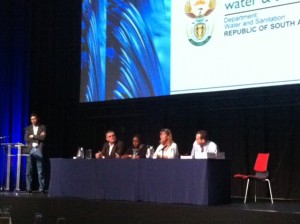Strategic Water Partners Network and South Africa Department of Water and Sanitation host session on No Drop certification

2030 WRG recently joined the biennial WISA conference hosted in Durban by the Water Institute of Southern Africa (WISA), where the Strategic Water Partners Network (SWPN) hosted a session jointly with the Department for Water and Sanitation (DWS) focused on the ‘No Drop certification’. The WISA 2016 Conference and Exhibition gathered nearly 2000 water practitioners and researchers from across South Africa and with international delegations representing countries such as Denmark, the Netherlands and the USA. Main themes covered included: industrial water and effluent, mine water, wastewater, development planning and institutional affairs.
The purpose of SWPN’s session on the No Drop certification was to provide an overview of the status of non-revenue water and water losses in municipal water systems in South Africa, using the No Drop methodology. The No Drop Certification has been co-developed by the SWPN, its’ private sector partners and the DWS, to provide a certification for water use efficiency and water loss management. The No Drop thus complements previous incentive-based regulation such as the ‘Blue Drop certification’ for drinking water quality management and the ‘Green Drop certification’ for wastewater services regulation. Overall, this well-attended session provided an overview of water losses, NRW and water use efficiency drawing from the 2014 No Drop assessment results. It further highlighted the water loss status of municipalities in South Africa, alongside providing a road map for the coming years of implementation.
The session was opened by Ms. Lindiwe Lusenga, Deputy Director-General for the International Water Cooperation at the DWS, who reiterated the value of collaboration in developing the No Drop as a key tool to drive South Africa’s “War on Leaks” programme and in addressing today’s challenges of non-revenue water. She further highlighted the critical role of water loss management in achieving the newly adopted Sustainable Development Goal (SDG) focusing on long term sustainable water and sanitation provision. A presentation was made on the results of the No Drop assessment consolidated and concluded in 2015, by Willem Wegelin from WRP Consulting Engineers who was a key role player in the development of the No Drop score card. The results demonstrated a certain level of progress in the reduction of non-revenue water particularly within the metropolitan municipalities, however with significant variation in performance at municipal level across the nation. The results further highlighted the significant scope for improvements in reporting levels, data accuracy, NRW targeted activities and improved efficiency, as outlined in the released ‘2016 No Drop Report – Benchmarking of Water Loss, Water Use Efficiency and Non-Revenue Water in South African Municipalities’.
Tony Ceronio, from CSV Water Consulting Engineers, further provided an overview of how the No Drop Progress Assessment Tool (PAT) can be used to gauge progress with less extensive auditing requirements. This tool allows for an annual measurement of progress which will allow time to implement measures in between the more rigorous biennial audits. Following this, Marlene van der Merwe-Botha from the Water Group, and Moloko Raletjena from DWS provided the regulatory perspective on the value of the No Drop certification alongside the road map for its’ implementation over the coming ten years. In 2016, the No Drop Risk Rating – through the PAT – will be done in all municipalities, whilst the full No Drop audit will be done in 2017 for all metropolitan municipalities (with a 5-criteria No Drop audit to be rolled out for the remainder of municipalities). From 2018 and onwards, biennial No Drop audits will be done using a differentiated approach, with a strong capacity building component offered for the municipalities in need of support.
A discussion around how to best support municipalities to achieve the requirements of the No Drop certification followed, facilitated by Mr. Sanjeev Raghubir from Nestlé, in his capacity as Chair of the SWPN working group on Water Use Efficiency and Leakage Reduction. Finally, the release of the No Drop report was officially announced by Ms. Raletjena. The full report will be released online Monday 23 May. In closing, Zama Siqalaba provided insights to opportunities for public-private sector collaboration, such as mentoring on water use efficiency, and welcomed municipalities to reach out to leverage the expertise of the private sector in joint efforts to address the issue of non-revenue water moving forward. Printed copies of the overarching report were made available to the workshop participants by the SWPN on site.
For additional information on WISA 2016, please visit their website http://www.wisa2016.org.za.
